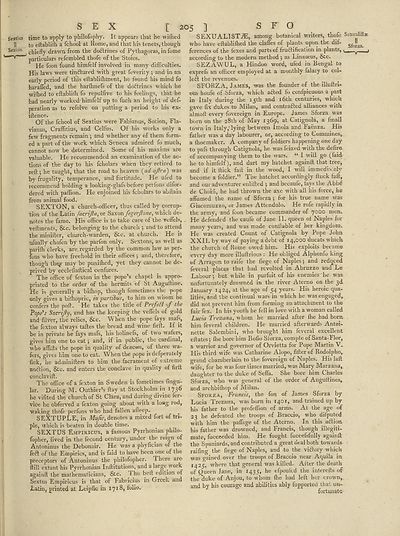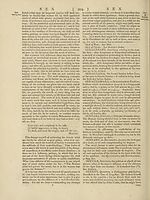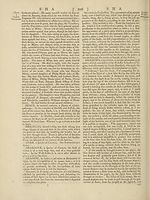Encyclopaedia Britannica, or, a Dictionary of arts, sciences, and miscellaneous literature : enlarged and improved. Illustrated with nearly six hundred engravings > Volume 19, Scripture-SUG
(215) Page 205
Download files
Complete book:
Individual page:
Thumbnail gallery: Grid view | List view

Sextus.
Sa E X t
Sextros time to apply to philofopby. It appears that he wifhed
H to eftablith a fchool at Rome, and that his tenets, though
chiefly drawn, from the doctrines of Pythagoras, in fome
particulars refembled thofe of the Stoics.
He foon found himfelf involved in many difficulties.
His laws were tin&ured with great feverity •, and in an
early period of this eftabliihment, he found his mind fo
haraffed, and the harffinefs of the doctrines which he
wiffied to eflabliffi fo repulfive to his feelings, that he
had nearly worked himfelf up to fuch an height of def-
peration as to refolve on putting a period to his ex-
iftence.
Of the fchool of Sextius were Fabianus, Sotion, Fla-
vianus, Craffitius, and Celfus. Of his works only a
few fragments remain •, and whether any of them form¬
ed a part of the work which Seneca admired fo much,
cannot now be determined. Some of his maxims are
valuable. He recommended an examination of the ac¬
tions of the day to his fcholars when they retired to
reft; he taught, that the road to heaven (W (tjh'a) was
by frugality, temperance, and fortitude. He ufed to
recommend holding a looking-glafs before perfons difor-
dered with paffion. He enjoined his fcholars to abftain
from animal food.
SEXTON, a church-officer, thus called by corrup¬
tion of the bmn facrifta, or Saxon fegcrjlone, which de
205 ] S F O
SEXUALISTiE, among botanical writers, thofe Scxnaliftje
who have eftabliffied the claffes ol plants upon the dif-
ferences of the lexes and parts of fruftification in plants, ■ ^ ■
according to the modern method } as Linnaeus, &c.
SEZAWUL, a Hindoo word, ufed in Bengal to
exprefs an officer employed at a monthly falary to col-
left the revenues.
SFORZA, James, was the founder of the illuftri-
ous houfe of Sforza, Avhich afted lo confpicuous a part
in Italy during the 15th and i6th centuries, which
gave fix dukes to Milan, and contrafted alliances with
almoft every fovereign in Europe. James Sforza was
born on the 28th of May 1369, at Catignola, a finall
town in Italy,-lying between Imola and Facnza. His
father was a day labourer, or, according to Comrnines,.
a ffioemaker. A company of foldiers happening one day
to pafs through Catignola, he w as feized with the defire
of accompanying them to the wars. “ I will go (laid
he to himfelf), and dart my hatchet againft that tree,
and if it ftick fall in the wood, I will immedirdelv
become a foldier.” The hatchet accordingly ftuck faft,
and our adventurer enlifted 5 and becaufe, lays the Abbd
de Choifi, he had thrown the axe with all Ids force, he
affumed the name of Sforza; for his true name was
Giacomuzzo, or James Attendulo. He rofe rapidly in
the army, and foon became commander of 7000 men.
notes the fame. His office is to take care of the veflels, He defended the caufe of Jane II. queen ol Naples lor
„ /-* <4 • ..1 1 1 J i _ 1.1. J „ d v.Tno r-i d m 1 V O K1 T M IT 1 IT rT/H (ATT)
veftments, &c. belonging to the church •, and to attend
the minifter, church-warden, &c. at church. He is
ufually chofen by the parfon only. Sextons, as well as
parilh clerks, are regarded by the common law as per¬
fons who have freehold in their offices •, and, therefore,
though they may be puniffied, yet they cannot be de¬
prived by ecclefiaftical cenfures.
The office of fexton in the pope’s chapel is appro¬
priated to the order of the hermits of St Auguftine.
He is generally a biffiop, though lometimes the pope
only gives a biffiopric, tn partibus, to him on whom he
confers the poll. He takes the title of Prefect <if the
Pope's SacriJIy, and has the keeping the veffels of gold
and filver, the relics, &c. W hen the pope lays mafs,
tire fexton always taftes the bread and wine firft. If it
be in private he fays mafs, his holinefs, of two wafers,
gives him one to eat; and, if in public, the cardinal,
who affifts the pope in quality of deacon, of three wa¬
fers, gives him one to eat. When the pope is defperately
fick, he adminifters to him the facrament of extreme
nnftion, &.c. and enters the conclave in quality of firft
conclavift.
The office of a fexton in Sweden is fometimes Angu¬
lar. During M. Outhier’s ftay at Stockholtn in 1736
he vifited the church of St Clara, and during divine fer-
vice he obferved a fexton going about with a long rod,
waking thofe perfons who had fallen afleep..
SEXTUPLE, in Mujic, denotes a mixed fort of tri¬
ple, which is beaten in double time.
SEXTUS Empiricus, a famous Pyrrhonian philo-
fopher, lived in the fecond century, under the reign of
Antoninus the Debonair. He was a phyfician of the
feft of the Empirics, and is faid to have been one of the
preceptors of Antoninus the philofopher. I here are
ftill extant his Pyrrhonian Inftitutions, and alarge rvoik
againft the mathematicians, &c. I he belt edition of
Sextus Empiricus is that of Fabricius in Greek and
Latin, printed at Leipfic in 1718, folio*
many years, and rvas made conftable of her kingdom.
He was created Count of Catignola by Pope John
XXII. by way of paying a debt of 14,000 ducats which
the church of Rome owed him. His exploits became
every day more illuftrious: He obliged Alphonfo king
of Arragon to raife the fiege of Naples; and reduced
feveral places that had revolted in Abruzzo and Le
Labour *, but while in purfuit of his enemieS'he was
unfortunately drowned in the river Aterno on the 3d
January 1424, at the age of 54 years. His heroic qua¬
lities, and the continual wars in w'hich he was engaged,
did not prevent him from forming an attachment to the
fair fex. In his youth he fell in love with a woman called
Lucia Trexana, whom he married after Are had born
him feveral children. He married afterwards Antoi¬
nette Salembini, who brought him feveral excellent
eftatesj fire bore him Bofio Sforza, compte of Santa-Flor,
a warrior and governor of Orvietta for Pope Martin V.
His third wife was Catharine Alopo, filler of Rodolpho,
grand chamberlain to the fovereign of Naples. His laft
wife, for he was four times married, w'as Mary Marzana,
daughter to the duke of Seffa. She bore him Charles
Sforza, who was general of the order of Augultines,
and archbilhop of Milan.
SFORZA, Francis, the fon of James Sforza by
Lucia Trezana, rvas born in 1401, and trained up by
his father to the profeffion of arms. At the age of
23 he defeated the troops of Braccio, who difputed
with him the paflage of the Aterno. In this aftion
his father was drowned, and Francis, though illegiti¬
mate, fucceeded him. He fought fuccefsfully againft
the Spaniards, and contributed a great deal both towards
raifing the fiege of Naples, and to the viftory which
was gained over the troops of Braccio near Aquila in
1425, where that general was killed. After the death
of fjueen Jane, in 1435, he efpoufed the interefts of
the duke of Anjou, to w'hom ffie had left her crown,
and by his courage and abilities ably fupported that un¬
fortunate
Sa E X t
Sextros time to apply to philofopby. It appears that he wifhed
H to eftablith a fchool at Rome, and that his tenets, though
chiefly drawn, from the doctrines of Pythagoras, in fome
particulars refembled thofe of the Stoics.
He foon found himfelf involved in many difficulties.
His laws were tin&ured with great feverity •, and in an
early period of this eftabliihment, he found his mind fo
haraffed, and the harffinefs of the doctrines which he
wiffied to eflabliffi fo repulfive to his feelings, that he
had nearly worked himfelf up to fuch an height of def-
peration as to refolve on putting a period to his ex-
iftence.
Of the fchool of Sextius were Fabianus, Sotion, Fla-
vianus, Craffitius, and Celfus. Of his works only a
few fragments remain •, and whether any of them form¬
ed a part of the work which Seneca admired fo much,
cannot now be determined. Some of his maxims are
valuable. He recommended an examination of the ac¬
tions of the day to his fcholars when they retired to
reft; he taught, that the road to heaven (W (tjh'a) was
by frugality, temperance, and fortitude. He ufed to
recommend holding a looking-glafs before perfons difor-
dered with paffion. He enjoined his fcholars to abftain
from animal food.
SEXTON, a church-officer, thus called by corrup¬
tion of the bmn facrifta, or Saxon fegcrjlone, which de
205 ] S F O
SEXUALISTiE, among botanical writers, thofe Scxnaliftje
who have eftabliffied the claffes ol plants upon the dif-
ferences of the lexes and parts of fruftification in plants, ■ ^ ■
according to the modern method } as Linnaeus, &c.
SEZAWUL, a Hindoo word, ufed in Bengal to
exprefs an officer employed at a monthly falary to col-
left the revenues.
SFORZA, James, was the founder of the illuftri-
ous houfe of Sforza, Avhich afted lo confpicuous a part
in Italy during the 15th and i6th centuries, which
gave fix dukes to Milan, and contrafted alliances with
almoft every fovereign in Europe. James Sforza was
born on the 28th of May 1369, at Catignola, a finall
town in Italy,-lying between Imola and Facnza. His
father was a day labourer, or, according to Comrnines,.
a ffioemaker. A company of foldiers happening one day
to pafs through Catignola, he w as feized with the defire
of accompanying them to the wars. “ I will go (laid
he to himfelf), and dart my hatchet againft that tree,
and if it ftick fall in the wood, I will immedirdelv
become a foldier.” The hatchet accordingly ftuck faft,
and our adventurer enlifted 5 and becaufe, lays the Abbd
de Choifi, he had thrown the axe with all Ids force, he
affumed the name of Sforza; for his true name was
Giacomuzzo, or James Attendulo. He rofe rapidly in
the army, and foon became commander of 7000 men.
notes the fame. His office is to take care of the veflels, He defended the caufe of Jane II. queen ol Naples lor
„ /-* <4 • ..1 1 1 J i _ 1.1. J „ d v.Tno r-i d m 1 V O K1 T M IT 1 IT rT/H (ATT)
veftments, &c. belonging to the church •, and to attend
the minifter, church-warden, &c. at church. He is
ufually chofen by the parfon only. Sextons, as well as
parilh clerks, are regarded by the common law as per¬
fons who have freehold in their offices •, and, therefore,
though they may be puniffied, yet they cannot be de¬
prived by ecclefiaftical cenfures.
The office of fexton in the pope’s chapel is appro¬
priated to the order of the hermits of St Auguftine.
He is generally a biffiop, though lometimes the pope
only gives a biffiopric, tn partibus, to him on whom he
confers the poll. He takes the title of Prefect <if the
Pope's SacriJIy, and has the keeping the veffels of gold
and filver, the relics, &c. W hen the pope lays mafs,
tire fexton always taftes the bread and wine firft. If it
be in private he fays mafs, his holinefs, of two wafers,
gives him one to eat; and, if in public, the cardinal,
who affifts the pope in quality of deacon, of three wa¬
fers, gives him one to eat. When the pope is defperately
fick, he adminifters to him the facrament of extreme
nnftion, &.c. and enters the conclave in quality of firft
conclavift.
The office of a fexton in Sweden is fometimes Angu¬
lar. During M. Outhier’s ftay at Stockholtn in 1736
he vifited the church of St Clara, and during divine fer-
vice he obferved a fexton going about with a long rod,
waking thofe perfons who had fallen afleep..
SEXTUPLE, in Mujic, denotes a mixed fort of tri¬
ple, which is beaten in double time.
SEXTUS Empiricus, a famous Pyrrhonian philo-
fopher, lived in the fecond century, under the reign of
Antoninus the Debonair. He was a phyfician of the
feft of the Empirics, and is faid to have been one of the
preceptors of Antoninus the philofopher. I here are
ftill extant his Pyrrhonian Inftitutions, and alarge rvoik
againft the mathematicians, &c. I he belt edition of
Sextus Empiricus is that of Fabricius in Greek and
Latin, printed at Leipfic in 1718, folio*
many years, and rvas made conftable of her kingdom.
He was created Count of Catignola by Pope John
XXII. by way of paying a debt of 14,000 ducats which
the church of Rome owed him. His exploits became
every day more illuftrious: He obliged Alphonfo king
of Arragon to raife the fiege of Naples; and reduced
feveral places that had revolted in Abruzzo and Le
Labour *, but while in purfuit of his enemieS'he was
unfortunately drowned in the river Aterno on the 3d
January 1424, at the age of 54 years. His heroic qua¬
lities, and the continual wars in w'hich he was engaged,
did not prevent him from forming an attachment to the
fair fex. In his youth he fell in love with a woman called
Lucia Trexana, whom he married after Are had born
him feveral children. He married afterwards Antoi¬
nette Salembini, who brought him feveral excellent
eftatesj fire bore him Bofio Sforza, compte of Santa-Flor,
a warrior and governor of Orvietta for Pope Martin V.
His third wife was Catharine Alopo, filler of Rodolpho,
grand chamberlain to the fovereign of Naples. His laft
wife, for he was four times married, w'as Mary Marzana,
daughter to the duke of Seffa. She bore him Charles
Sforza, who was general of the order of Augultines,
and archbilhop of Milan.
SFORZA, Francis, the fon of James Sforza by
Lucia Trezana, rvas born in 1401, and trained up by
his father to the profeffion of arms. At the age of
23 he defeated the troops of Braccio, who difputed
with him the paflage of the Aterno. In this aftion
his father was drowned, and Francis, though illegiti¬
mate, fucceeded him. He fought fuccefsfully againft
the Spaniards, and contributed a great deal both towards
raifing the fiege of Naples, and to the viftory which
was gained over the troops of Braccio near Aquila in
1425, where that general was killed. After the death
of fjueen Jane, in 1435, he efpoufed the interefts of
the duke of Anjou, to w'hom ffie had left her crown,
and by his courage and abilities ably fupported that un¬
fortunate
Set display mode to:
![]() Universal Viewer |
Universal Viewer | ![]() Mirador |
Large image | Transcription
Mirador |
Large image | Transcription
Images and transcriptions on this page, including medium image downloads, may be used under the Creative Commons Attribution 4.0 International Licence unless otherwise stated. ![]()
| Permanent URL | https://digital.nls.uk/192698077 |
|---|
| Attribution and copyright: |
|
|---|
| Description | Ten editions of 'Encyclopaedia Britannica', issued from 1768-1903, in 231 volumes. Originally issued in 100 weekly parts (3 volumes) between 1768 and 1771 by publishers: Colin Macfarquhar and Andrew Bell (Edinburgh); editor: William Smellie: engraver: Andrew Bell. Expanded editions in the 19th century featured more volumes and contributions from leading experts in their fields. Managed and published in Edinburgh up to the 9th edition (25 volumes, from 1875-1889); the 10th edition (1902-1903) re-issued the 9th edition, with 11 supplementary volumes. |
|---|---|
| Additional NLS resources: |
|

